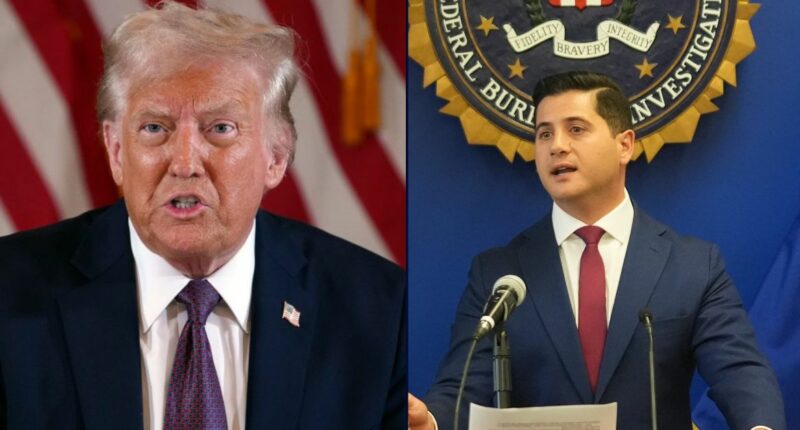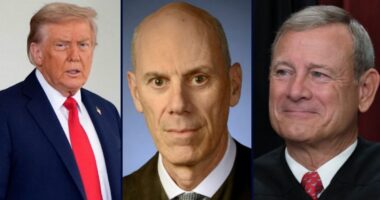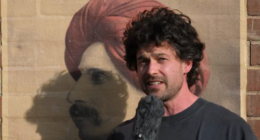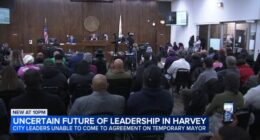Share this @internewscast.com
Left: President Donald Trump speaks during a meeting with Republican governors at Mar-a-Lago, Thursday, Jan. 9, 2025, in Palm Beach, Fla. (AP Photo/Evan Vucci). Right: U.S. Attorney Bill Essayli, at podium with Akil Davis, the Assistant Director in Charge of the FBI’s Los Angeles Field Office, left, answering questions during a news conference in Los Angeles, Wednesday, June 4, 2025. (AP Photo/Damian Dovarganes).
In the wake of the DOJ’s response to criminal defendants challenging the appointment of another acting U.S. attorney from the Trump administration, objectors have urged a federal judge to rule that Bilal “Bill” Essayli is unsuited for the role of top prosecutor in the Central District of California due to his “absurd,” “bizarre,” and mystifying arguments.
The legal representatives for criminal defendants Ismael Garcia, Jr., and Jaime Hector Ramirez submitted a filing on Friday criticizing the DOJ’s attempt to support Essayli’s role, characterizing it as “a guide for bypassing the safeguards that the Constitution and Congress instituted against the unbounded and unchecked appointing of temporary officials” by President Donald Trump and U.S. Attorney General Pam Bondi. Bondi has often placed temporary leaders in U.S. attorneys’ offices while leaving the first assistant roles—that is, second in command—unfilled.
“According to the government’s understanding of the Federal Vacancies Reform Act, agency leaders aiming to fill a Senate-confirmed position can dismiss the first assistant and replace them with anyone of their choice, thereby automatically promoting them,” court documents stated, pointing out that Bondi has extended such appointees enhanced supervisory control over the U.S. attorneys’ office, irrespective of the legitimacy of their appointment as head prosecutor.
Should these tactics be accepted, it would enable current and future presidents to appoint “never-confirmed, FVRA-ineligible shadow officials” who have “no limits or eligibility requirements,” and to do so “indefinitely,” argued Garcia and Ramirez’s attorneys. This represents a “loophole” previously disallowed in the case against former Trump personal attorney Alina Habba, and one that Senior U.S. District Judge J. Michael Seabright, a George W. Bush appointee, should similarly dismiss, the defendants proposed.
“The government’s interpretation ‘exposes a significant loophole’ that ‘directly contradicts the objective Congress intended,'” claimed the filing supporting Essayli’s disqualification and the dismissal of the indictments. “The Court should reject that loophole, just as it should reject the government’s other poorly substantiated arguments.”
From here, the criminal defendants tore into DOJ’s “bizarre,” “absurd,” and puzzling attempt to kick their challenges out of court for lack of “civil” standing, even as the government “largely ignore[d]” and barely mentioned — “except in a throwaway footnote saying it ‘was incorrect'” — the reasoning behind the invalidation of Habba’s authority.
“In addition to violating the FVRA, Mr. Essayli’s service is unlawful under the 120-day clock at 28 U.S.C. § 546(c)(2) and the Appointments Clause. Mr. Garcia and Mr. Ramirez can challenge their criminal prosecution by an unauthorized official—notwithstanding the government’s bizarre citations to cases about plaintiffs‘ standing in civil cases—and they are entitled to adequate remedies,” court documents continued, adding later on the same issue:
The government puzzlingly argues defendants must establish civil standing in order move to dismiss their criminal case or disqualify a prosecutor. Tellingly, it found no criminal cases to support that idea. And although the government concedes that standing rules apply to “a plaintiff,” it never acknowledges the government is the plaintiff here. Even in civil cases, the proposition is absurd: a defendant does not need standing to move to dismiss a complaint. His “standing” is the fact he was dragged into court in the first place.
Given all of the foregoing, Garcia and Ramirez assert that, at minimum, Essayli and those prosecutors under his supervision should be disqualified from the prosecutions in the district and that, at most, the indictments should be thrown out “with prejudice,” so the charges can’t be brought again.
The filing comes as defendants in New Jersey attempt to uphold Habba’s disqualification on appeal and as Nevada defendants continue to push for Sigal Chattah’s invalidation. The Trump administration has repeatedly used acting appointments of U.S. attorneys to sidestep the U.S. Senate’s advice and consent role in confirming nominees to the permanent position.
The most recent iteration of prosecutorial musical chairs took place in the Eastern District of Virginia, where court-appointed U.S. Attorney Erik Siebert was forced out by the president and replaced with another former Trump personal attorney, Lindsey Halligan, who used her acting authority to immediately move forward with an indictment of ex-FBI Director James Comey — a series of events that at least one conservative legal commentator believes was unlawful, leaving aside questions about the strength of the charges themselves.














